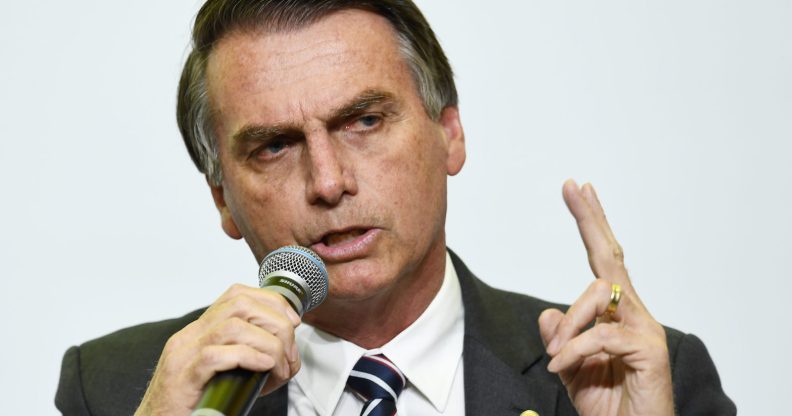Fears grow that Brazilian homophobe Jair Bolsonaro could use Supreme Court nominations to roll back hard-won LGBT+ rights

Jair Bolsonaro.(EVARISTO SA/AFP/Getty)
Brazil’s homophobic president Jair Bolsonaro is set to appoint two new Supreme Court judges ahead of the 2022 elections, which campaigners warn could mean a rollback of LGBT+ rights.
In recent times the Brazilian Supreme Court, known as the STF, has ruled many times in favour of LGBT+ rights, going against the country’s conservative society, its homophobic president and a congress strongly influenced by the Catholic church.
The Supreme Court has been responsible for the legalisation of same-sex marriage in 2013, ruling that trans people are not required to have surgery to legally change their gender in 2018 and criminalising homophobia and transphobia in 2019.
Renan Quinalha, a law professor at the Federal University of Sao Paulo, told the Thomson Reuters Foundation: “The Brazilian legislature has been occupied by conservative forces and has a very large, religious fundamentalist bench.
“[So] LGBT+ groups have started to go through the Supreme Court, doing strategic litigation and advocacy to achieve victories in the judiciary.”
Jair Bolsonaro could make the Supreme Court majority conservative within a few years.
Two of Brazil’s 11 Supreme Court judges – Celso de Mello and Marco Aurelio Mello – will reach the age of 75 before the 2022 elections, when they are obligated to retire.
Bolsonaro, who is openly against LGBT+ rights, has previously called himself a “proud homophobe” and insisted he’d rather have a dead son than a gay son, will be responsible for replacing the retired judges.
If the anti-LGBT+ leader is re-elected in 2022, he will be able to replace two more retirement-age judges in 2023.
Quinalha added: “If you have a different majority in the Supreme Court, you can change previous judgments.”
As well as having a potential conservative majority in the Supreme Court, single judges are able to stall rulings indefinitely if they say they need more time to consider their vote.
With previous LGBT+ rights rulings having gone through the courts instead of congress, it has left less room for public debate on the issues. This, campaigners said, makes the legislation more vulnerable.
Quinalha said: “A law is more consolidated because it also expresses a debate in public opinion … so it’s more difficult to modify.”
Leandro Ramos, the Brazil director for All Out, added: “In places where there’s been a social debate around the rights of LGBT people, the process of discussion and debate made it easier for society to adjust to the new reality.
“The fact that this debate never happened inside congress has made these rights more vulnerable.”

